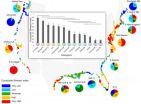(Press-News.org) It's time to question the common belief that patients receiving intensive blood pressure treatment are prone to falling and breaking bones. A comprehensive study in people ages 40 to 79 with diabetes, led by Karen Margolis, MD, of HealthPartners Institute for Education and Research in the US, found no evidence supporting this belief. The study¹ appears in the Journal of General Internal Medicine², published by Springer.
Evidence from various clinical trials shows that cardiovascular events such as strokes can be prevented by treating high blood pressure (hypertension). However, physicians and patients still often express concern that its tight control may increase a person's risk of low blood pressure (hypotension) and subsequent falls and fractures.
Scientific data to support this notion are sparse. Therefore, Margolis and her associates compared the number of falls and fractures of type 2 diabetes patients receiving two types of blood pressure treatment. The intensive group (which included 1,534 participants) received treatment aimed at a systolic blood pressure of END
Blood pressure medication does not cause more falls
Study on patients with type 2 diabetes examined fracture risk with antihypertensive treatment
2014-08-18
ELSE PRESS RELEASES FROM THIS DATE:
Study: World's primary forests on the brink
2014-08-18
August 18, 2014: An international team of conservationist scientists and practitioners has published new research showing the precarious state of the world's primary forests.
The global analysis and map are featured in a paper appearing in the esteemed journal Conservation Letters and reveals that only five percent of the world's pre-agricultural primary forest cover is now found in protected areas.
Led by Professor Brendan Mackey, Director of the Climate Change Response Program at Griffith University in Queensland, Australia, the authors are experts in forest ecology, ...
Study reveals immune system is dazed and confused during spaceflight
2014-08-18
There is nothing like a head cold to make us feel a little dazed. We get things like colds and the flu because of changes in our immune system. Researchers have a good idea what causes immune system changes on Earth—think stress, inadequate sleep and improper nutrition. But the results of two NASA collaborative investigations—Validation of Procedures for Monitoring Crewmember Immune Function (Integrated Immune) and Clinical Nutrition Assessment of ISS Astronauts, SMO-016E (Clinical Nutrition Assessment)—recently published in the Journal of Interferon & Cytokine Research ...
New tool makes online personal data more transparent
2014-08-18
New York, NY—August 18, 2014—The web can be an opaque black box: it leverages our personal information without our knowledge or control. When, for instance, a user sees an ad about depression online, she may not realize that she is seeing it because she recently sent an email about being sad. Roxana Geambasu and Augustin Chaintreau, both assistant professors of computer science at Columbia Engineering, are seeking to change that, and in doing so bring more transparency to the web. Along with their PhD student, Mathias Lecuyer, the researchers have developed XRay, a new ...
A new species of endemic treefrog from Madagascar
2014-08-18
A new species of the Boophis rappiodes group is described from the hidden streams of Ankarafa Forest, northwest of Madagascar. The study was published in the open access journal ZooKeys.
The new species Boophis ankarafensis is green in colour with bright red speckling across its head and back, but what truly distinguishes this species is a high genetic divergence and different call with a triple click, compared to the usual double.
All individuals were detected from the banks of two streams in Ankarafa Forest. The new species represents the only member of the B. ...
Project serves up big data to guide managing nation's coastal waters
2014-08-18
When it comes to understanding America's coastal fisheries, anecdotes are gripping – stories of a choking algae bloom, or a bay's struggle with commercial development. But when it comes to taking action, there's no beating big data.
In this week's edition of Estuaries and Coasts, a Michigan State University doctoral student joins with others to give a sweeping assessment to understand how human activities are affecting estuaries, the nation's sounds, bays, gulfs and bayous. These are places where freshwater flows into the oceans, and the needs of the people blend with ...
500 million year reset for the immune system
2014-08-18
This news release is available in German.
Scientists at the Max Planck Institute of Immunobiology and Epigenetics (MPI-IE) in Freiburg re-activated expression of an ancient gene, which is not normally expressed in the mammalian immune system, and found that the animals developed a fish-like thymus. To the researchers surprise, while the mammalian thymus is utilized exclusively for T cell maturation, the reset thymus produced not only T cells, but also served as a maturation site for B cells – a property normally seen only in the thymus of fish. Thus the model ...
GW researchers develop model to study impact of faculty development programs
2014-08-18
WASHINGTON (Aug. 18, 2014) — Methods used to demonstrate the impact of faculty development programs have long been lacking. A research report from the George Washington University (GW) introduces a new model to demonstrate how faculty development programming can affect institutional behaviors, beyond the individual participant.
"Faculty development is essential for helping medical education faculty meet the demands of their roles as teachers, scholars, administrators, and leaders," said co-author Ellen Goldman, MBA, Ed.D., associate professor of clinical research and ...
Electric vehicle consumers better off with electric range under 100 miles: INFORMS study
2014-08-18
Until battery cost is cut down to $100 per kilowatt hour, the majority of U.S. consumers for battery electric vehicles (BEV) will be better off by choosing an electric vehicle with a range below 100 miles, according to a new study in the Articles in Advance section of Transportation Science, a journal of the Institute for Operations Research and the Management Sciences (INFORMS).
The research suggests reconsideration of the R&D goal that battery electric vehicles should have a driving range similar to that of conventional vehicles. It also implies that the focus of policy ...
Free fatty acids may be as effective as antibiotics in treating catheter infections
2014-08-18
PROVIDENCE, R.I. – Researchers at Rhode Island Hospital, Veterans Affair Medical Center in Providence and University of Rhode Island have found that a free fatty acid, made up of compounds similar to those naturally made in the body, may be as effective at fighting certain infections as antibiotics. The study is published online in advance of print in the Journal of Antimicrobial Chemotherapy.
"More and more bacteria are developing resistance to commonly used antibiotics," said Leonard Mermel, D.O., medical director of the department of epidemiology and infection control ...
Did an exceptional iceberg sink the Titanic?
2014-08-18
While the sinking of the Titanic in 1912 is typically blamed on human, design and construction errors, a new Significance paper points to 2 other unfavorable factors outside human control: there were a greater number of icebergs than normal that year, and weather conditions had driven them further south, and earlier in the year, than was usual.
The paper also notes that iceberg discharge from glaciers is increasing, with more heavy iceberg years since the 1980s than before, and increasing global warming will likely cause this trend to continue.
"As use of the Arctic ...
LAST 30 PRESS RELEASES:
New knowledge on heritability paves the way for better treatment of people with chronic inflammatory bowel disease
Under the Lens: Microbiologists Nicola Holden and Gil Domingue weigh in on the raw milk debate
Science reveals why you can’t resist a snack – even when you’re full
Kidney cancer study finds belzutifan plus pembrolizumab post-surgery helps patients at high risk for relapse stay cancer-free longer
Alkali cation effects in electrochemical carbon dioxide reduction
Test platforms for charging wireless cars now fit on a bench
$3 million NIH grant funds national study of Medicare Advantage’s benefit expansion into social supports
Amplified Sciences achieves CAP accreditation for cutting-edge diagnostic lab
Fred Hutch announces 12 recipients of the annual Harold M. Weintraub Graduate Student Award
Native forest litter helps rebuild soil life in post-mining landscapes
Mountain soils in arid regions may emit more greenhouse gas as climate shifts, new study finds
Pairing biochar with other soil amendments could unlock stronger gains in soil health
Why do we get a skip in our step when we’re happy? Thank dopamine
UC Irvine scientists uncover cellular mechanism behind muscle repair
Platform to map living brain noninvasively takes next big step
Stress-testing the Cascadia Subduction Zone reveals variability that could impact how earthquakes spread
We may be underestimating the true carbon cost of northern wildfires
Blood test predicts which bladder cancer patients may safely skip surgery
Kennesaw State's Vijay Anand honored as National Academy of Inventors Senior Member
Recovery from whaling reveals the role of age in Humpback reproduction
Can the canny tick help prevent disease like MS and cancer?
Newcomer children show lower rates of emergency department use for non‑urgent conditions, study finds
Cognitive and neuropsychiatric function in former American football players
From trash to climate tech: rubber gloves find new life as carbon capturers materials
A step towards needed treatments for hantaviruses in new molecular map
Boys are more motivated, while girls are more compassionate?
Study identifies opposing roles for IL6 and IL6R in long-term mortality
AI accurately spots medical disorder from privacy-conscious hand images
Transient Pauli blocking for broadband ultrafast optical switching
Political polarization can spur CO2 emissions, stymie climate action
[Press-News.org] Blood pressure medication does not cause more fallsStudy on patients with type 2 diabetes examined fracture risk with antihypertensive treatment





